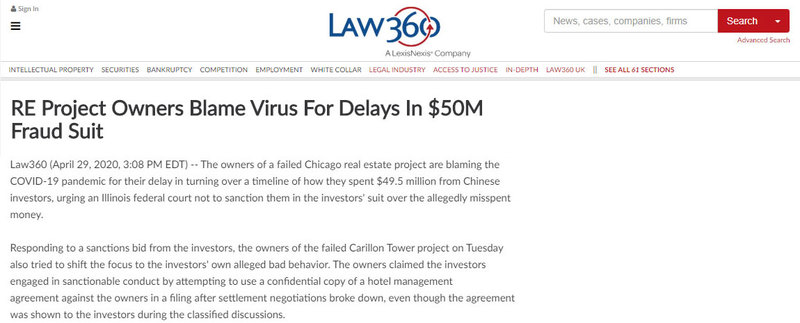RE Project Owners Blame Virus For Delays In $50M Fraud Suit
The owners of a failed Chicago real estate project are blaming the COVID-19 pandemic for their delay in turning over a timeline of how they spent $49.5 million from Chinese investors, urging an Illinois federal court not to sanction them in the investors' suit over the allegedly misspent money.
Responding to a sanctions bid from the investors, the owners of the failed Carillon Tower project on Tuesday also tried to shift the focus to the investors' own alleged bad behavior. The owners claimed the investors engaged in sanctionable conduct by attempting to use a confidential copy of a hotel management agreement against the owners in a filing after settlement negotiations broke down, even though the agreement was shown to the investors during the classified discussions.
"To make matters worse, plaintiffs' counsel apparently lacked the basic competence to file documents under seal, and lodged the confidential hotel management agreement on the public docket," the owners said.
The investors told the court earlier this month that negative inferences should be drawn from the project owners' failure to meet a firm April 3 deadline to chronologically prove what happened to their money. Missing the cutoff warrants sanctions, the investors said.
In their response Tuesday, the owners didn't deny they missed the deadline to chronologically account for the use of the funds but told the court that stay-at-home orders and a furloughed bank workforce have made it nearly impossible to prepare the timeline to a standard they deem fit to be submitted. They told the court they would either submit the information or have a date they expect to fulfill the request by on May 1.
The owners further defended the delay, saying the information sought by the court is an "unfamiliar sort of discovery order." They also said they have been doing virtually all the leg work in discovery, claiming the investors haven't provided a single affirmative document or interrogatory answer.
"Defendants have worked hard and diligently responding to plaintiffs' discovery requests, and do not deserve the opprobrium heaped on them," the owners said.
The owners asked the court not to punish them but said if it must, a "modest monetary sanction" should be the extent of it.
The lawsuit, filed in November 2018, stems from a planned 42-story building in Chicago's Magnificent Mile that never came into existence. Investors were told it would house a 200-unit Hilton hotel, more than 150 apartments and parking spaces, and a restaurant, according to court documents.
U.S. District Judge Charles P. Kocoras certified the class of Chinese investors in September.
Lead plaintiff Lina Dou claims the tower project was scheduled to break ground in 2015, was to be finished in 2017 and was marketed to Chinese investors as an EB-5 path to a green card, as part of a federal program that gives foreign investors a path to citizenship if they invest at least $500,000 toward job-creating real estate endeavors.
But in reality, "no shovel was ever put into the ground" after the entire plan was rejected by city aldermen and never even submitted to Chicago's planning and development commissioner, according to the lawsuit. While the project has gone nowhere in four years, investors say, their money is gone.
The $49.5 million was placed into an escrow account with defendant TD Bank NA and was to be released only on the condition that the project was approved by the commissioner, but the Chinese investors claim the bank instead released the money in 2015 to entities controlled by Jeffrey Laytin, also listed as a defendant on the case.
Dou and the other investors have alleged violations of the federal Securities Exchange Act, the Illinois Securities Act, breach of contract of escrow agreement, tortious conversion, fraud and breach of fiduciary duty.
Daniel G. Hildebrand of Greenberg Traurig LLP, the lead counsel for the owners, declined to comment. Representatives for the investors did not immediately respond to requests for comment Wednesday.
The investors are represented by Glen J. Dunn Jr. of Glen J. Dunn & Associates and Douglas Eliot Litowitz.
Carillon Tower LP, Forefront EB-5 Fund LLC, Symmetry Property Development II LLC and Jeffrey Laytin are represented by Daniel G. Hildebrand, Aaron Seth Klein and Arthur Don of Greenberg Traurig LLP.
TD Bank is represented by Edward N. Moss and Nathaniel Asher of O'Melveny & Myers LLP and Kevin Buckley Duff and Michael Rachlis of Rachlis Duff Adler Peel & Kaplan LLC.
The case is Dou v. Carillon Tower/Chicago LP et al., case number 1:18-cv-07865, in the U.S. District Court for the Northern District of Illinois.
https://www.law360.com/articles/1268554/re-project-owners-blame-virus-for-delays-in-50m-fraud-suit
Litigation Cases
States
- Illinois
Videos





Subscribe for News
Site Digest
Join Professionals on EB5Projects.com →
Securities Disclaimer
This website is for informational purposes only and does not constitute an offer or solicitation to sell shares or securities. Any such offer or solicitation will be made only by means of an investment's confidential Offering Memorandum and in accordance with the terms of all applicable securities and other laws. This website does not constitute or form part of, and should not be construed as, any offer for sale or subscription of, or any invitation to offer to buy or subscribe for, any securities, nor should it or any part of it form the basis of, or be relied on in any connection with, any contract or commitment whatsoever. EB5Projects.com LLC and its affiliates expressly disclaim any and all responsibility for any direct or consequential loss or damage of any kind whatsoever arising directly or indirectly from: (i) reliance on any information contained in the website, (ii) any error, omission or inaccuracy in any such information or (iii) any action resulting therefrom.



